Gangs are stealing luxury cars from British driveways before whisking them abroad within hours for sale in the Middle East and Africa – as this new graphic reveals.
Other expensive vehicles, including Range Rovers and Rolls-Royces, are shipped to Eastern Europe and then smuggled into Russia for use by sanctions-dodging Kremlin elites.
The highly sophisticated nature of the criminal gangs fuelling Britain’s £1.77billion-a-year car theft epidemic is shown by their use of £20,000 high-tech devices to trick keyless entry systems.
Stolen cars are then rapidly driven to Dover and loaded onto ferries before victims, lenders or the police can react.
One police investigator said a car could be shipped abroad with cloned number plates before the owner had even been able to report it stolen.
A new report contrasts the professionalism of gangs overseeing this ‘comprehensive logistical process’ with the lax police response – which has seen charging rates drop to just 2.6 per cent in 2023/2024.
Stolen cars are often broken into parts that end up in second-hand dealerships or scrapyards in Cyprus, the UAE and the Democratic Republic of Congo, where they are sold into other Middle Eastern and North African countries.
The illegal trade has driven an 82 per cent increase in car insurance premium quotes since 2021, according to the report, Organised Vehicle Theft in the UK: Trends and Challenges, by the Royal United Services Institute (RUSI).
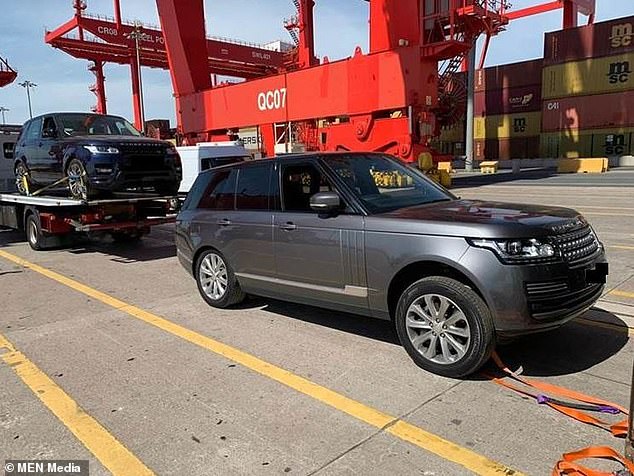
A Range Rover stolen by the gang that was seized by police before being shipped abroad

This gang, based in Oldham, Greater Manchester, were linked to almost 100 stolen cars, which were stolen and shipped off to the Middle East, or broken down for parts. Top row, left to right: Asif Matadar, Shewaz Rehman, Imran Taj. Bottom row: Zeeshan Ali, Adam Elwood and Mohammed Irfan
About 130,000 vehicles are stolen each year in the UK – many from driveways or on streets outside homes.
One gang operating in Oldham, Greater Manchester were jailed last year after being linked to nearly 100 stolen cars.
The group arranged for prestige cars including Range Rovers, Mercedes, Porsche and BMWs to be stolen to order before being shipped off to the Middle East, or broken down for parts.
Ringleader Asif Hussain was jailed for 15 years after he pleaded guilty to conspiracy to steal, conspiracy to handle stolen goods, conspiracy to export, and fraud.
The RUSI report says organised crime groups have ‘shopping lists’ of makes and models, indicating many are stolen to order.
While manufacturers have made it harder to hack into keyless entry systems, criminals are beating them in a tech ‘arms race’ by using specialised devices costing as much as £20,000.
These typically work by ‘relaying’ or amplifying the signal of the victim’s key fob, often located inside their home, to trick vehicles into believing the fob is nearby.
Sellers in Bulgaria and Poland advertise devices designed for specific high-end models including Audi, BMW, Mercedes, Lamborghini, Lexus and Porsche.
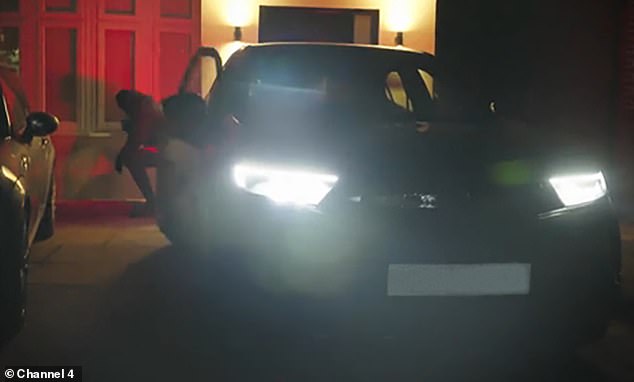
Two thieves recently showed a documentary crew how they could steal a keyless car in less than 20 seconds for a £5,000 fee
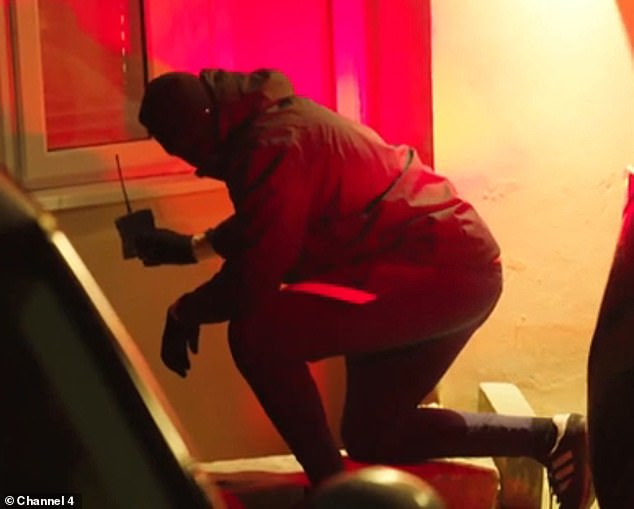
Thief ‘T’ and an accomplice demonstrated how they use an amplifier, which looks similar to a radio or walkie-talkie, to pick up the signal from the ‘key’ inside a home
As the report explains: ‘Vehicle theft is no longer a low-level, opportunistic crime, but rather a high-value, low-risk form of serious and organised crime with domestic and international dimensions.
‘The criminal vehicle theft economy is far more resilient than the public and private systems meant to stop it.’
The illicit trade was described as a response to a shortage of car parts across much of the Middle East and Africa.
Meanwhile, demand from Georgia and Azerbaijan could be an ‘unintended consequence of sanctions’ levied on Russia.
‘Examples have emerged of vehicles vanishing from UK streets and reappearing in Moscow,’ the report states.
‘Vehicle theft in the UK represents a perfect storm of increasing domestic and international demand, compounded and exploited by innovative and organised criminals.’
Despite the massive surge in car thefts, police forces have been ‘collapsing’ teams dedicated to tackling it.
The Met Police once had nearly 100 vehicle crime investigators, but this has now dwindled to only a ‘handful’.
The RUSI report calls for a national body to be created to investigate car thefts and recover vehicles from overseas, as well as tightened security at ports.
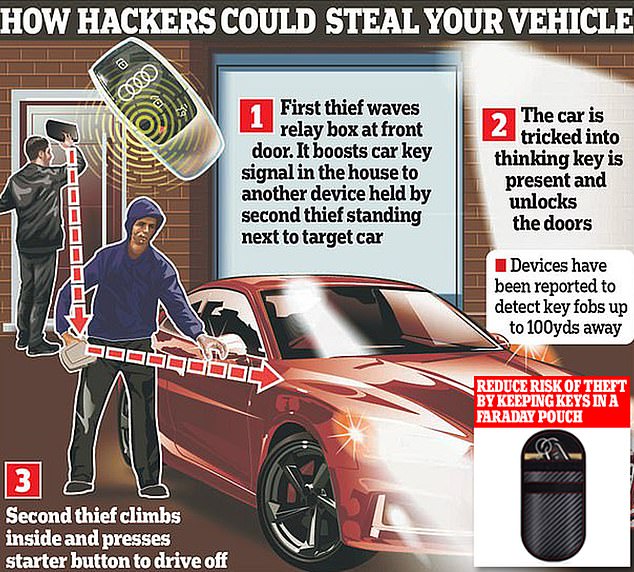
Criminals usually go in pairs to steal keyless cars. One holds a transmitter and stands next to the vehicle while the other stands close to the house holding an amplifier
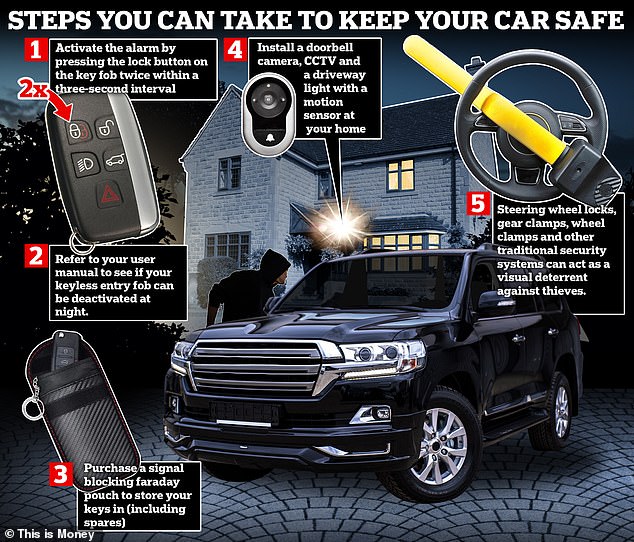
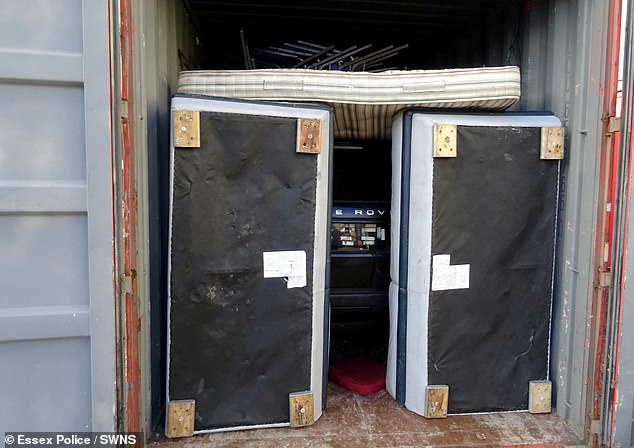
Last year, Essex Police found more than £14m worth of ‘chopped’ luxury cars as they were due to be shipped out of the country
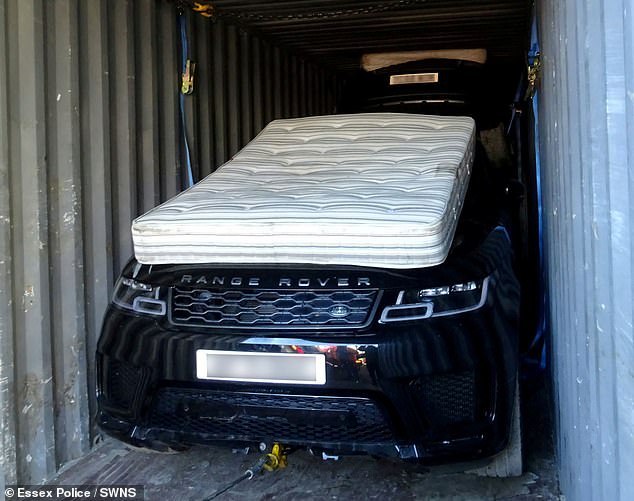
A Range rover recovered by Essex’s Stolen Vehicle Intelligence Unit (SVIU)
While many stolen cars are rapidly shipped out of the UK, others are left to ‘cool off’ before export to check if they are fitted with trackers.
One industrial estate in Essex was recently exposed as a storage facility for an international car smuggling ring exporting cars to Lithuania.
A stolen Audi fitted with a GPS device was tracked to Baldwins Farm after being stolen from a driveway in North London.
Five weeks later, it reappeared in the Lithuanian city of Kaunas, where the vehicle had already been broken down into parts.
During a recent Dispatches documentary, a reporter spoke to two thieves who showed how they could steal a keyless car in less than 20 seconds for a £5,000 fee.
Thief ‘T’ and an accomplice demonstrated how they use an amplifier, which looks similar to a radio or walkie-talkie, to pick up the signal from the ‘key’ inside a home and use it to unlock a car parked outside.
The two men, dressed in black and wearing balaclavas, demonstrated the technique on a car they claimed to have already stolen after placing the key fob in the living room of a property.
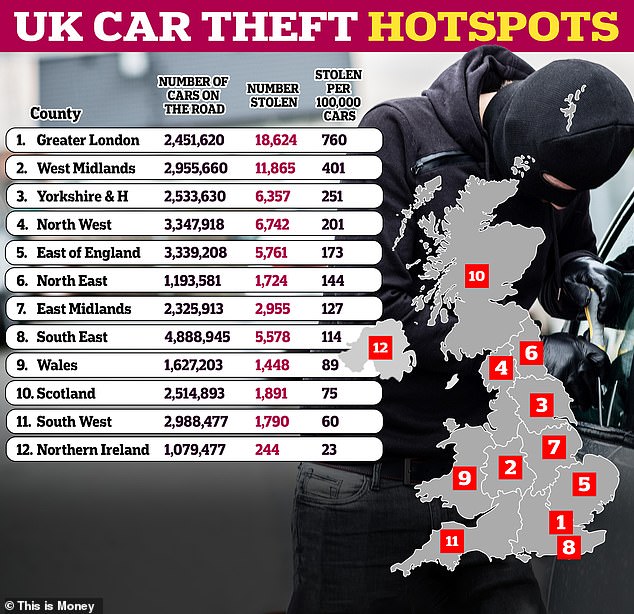
Greater London experienced the most car theft in total in 2023, with 18,624 recorded thefts from 2,451,620 cars on the road – 0.76 per cent are stolen
After just a few seconds of holding the amplifier outside the window, the car door unlocked, allowing T to simply open the door and start up the engine.
Once the engine had started, the accomplice could take the amplifier, jump in the car and they drove off – with the entire theft taking less than 20 seconds.
The men then boasted of taking up to 20 vehicles a month for as much as £5,000 per car, depending on its value, and said up to 90 percent of them are stolen for parts.
Asked whether they ever feel bad about their actions T said: ‘These cars are insured, that’s like, that’s a first world problem. There’s bigger s*** going on out there, that’s, like… Your f***ing Range Rover’s gone, boo-hoo, go and buy another one, man.’
He added: ‘A lot of these cars are getting broken for parts. A lot of them are getting shipped out, Albania, Bulgaria, Cyprus, Greece.’
Adam Gibson, an agent at the National Vehicle Crime Intelligence Service (NaVCIS) – which is funded by the car industry – said the value of vehicles stolen seems to be dropping while the volume is increasing.
‘Whereas we were finding Range Rover’s worth £150,000, we’re getting pickup trucks and SUVs worth £40,000 now,’ he said.
‘We are seeing brands like Hyundai, Kia, Toyota, Lexus. So the quality has dropped off, I suppose, but the volume has gone up.
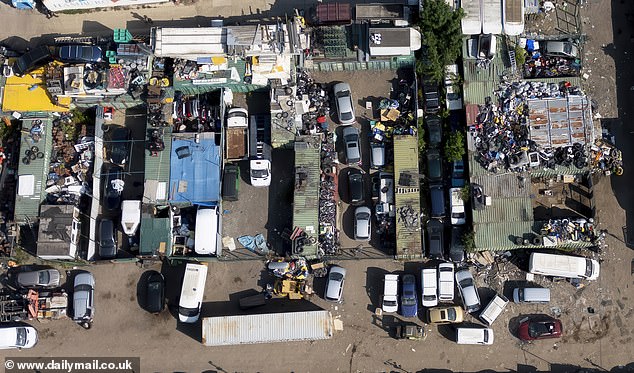
Baldwins Farm, an industrial estate in Essex, was recently exposed as a storage facility for an international car smuggling ring exporting cars to Lithuania
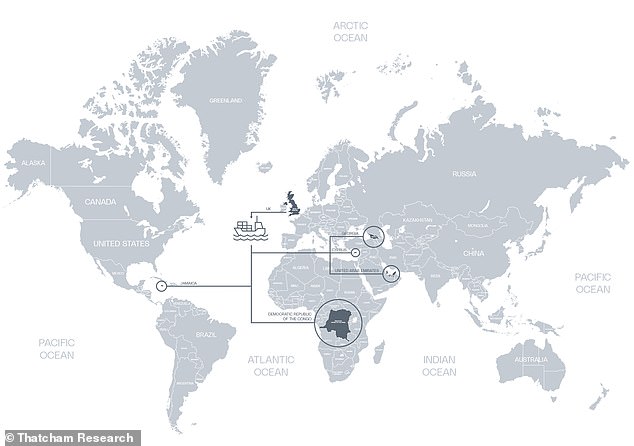
The United Arab Emirates (UAE) is the second most common destination for stolen UK cars (20.1%), followed some way behind by Cyprus (6.7%). Jamaica (5.7%) and Georgia (5.1%) were the fourth and fifth most common export countries respectively
‘Some gangs will literally gut the car of any personal effects. Others will just leave everything.
‘There’s kids seats, toys, all sorts of them… I’m constantly told by people that vehicle crime, where it’s victimless, it’s just the insurance companies.
‘Yes, the insurance company pay out, but we all get our premiums go up because the insurance aren’t going to absorb it. So it has a knock-on effect on everyone else.’












